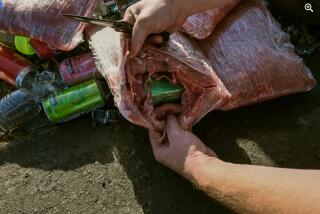Drug Users Convert Raw Meat to Currency
BALTIMORE — A raw scene: On a dark summer night in Curtis Bay, a 1994 Nissan pickup truck with a large cooler in back moves slowly down Pennington Avenue and turns left onto Cypress Street. A line of a half-dozen drug users--women and men--forms.
One by one, they deposit their packages in the cooler. A man in the front seat hands out the drugs. The deal is done.
But no money has changed hands. What gives? Where’s the beef?
In the cooler, of course.
All-American ground beef, steak and other meat products have a new use in some parts of Baltimore: currency in the drug trade.
Drug users say they typically shoplift the meat from area supermarkets, then give it to low-level dealers in exchange for drugs. The fact that meat goes bad quickly does not seem to be a deterrent. Police say the growing use of the perishable item is another sign of the speed of the drug trade and its reach into all manner of businesses.
“Meat is more expensive than most groceries, and so you can move it pretty quickly if you’re a user,” says Lt. Barry Baker of the Police Department’s Southern District. “Meat is becoming another kind of cash.”
Law enforcement officials offer no statistics on how much meat is grinding through the drug trade. But users, community activists and grocers have noticed the trend, particularly in south and southwest Baltimore. In Curtis Bay, Rylow Williams, a sheet metal worker, has even captured the pickup truck’s visit and other meat-for-drugs swaps on videotape.
“It’s a substitute for money and a good deal for the dealers,” Williams says. “I have gotten to know a lot of dealers who will take $50 worth of steak and give you a $10 rock.”
Bartering is hardly a new phenomenon in the drug trade. Dealers have long accepted everything from food stamps to cigarettes to electronics. Still, the use of meat to buy drugs is relatively new--and unknown in many city neighborhoods. “They’ll swap their cars, their TVs,” says police Maj. Bert Shirey of the Northeastern District. “But I’ve never heard of anybody trading meat.”
In the department’s Southwestern District, officers report exchanges of drugs for shrimp, as well as beef.
Several drug users, many of them women, say they have been stealing beef for as long as they remember, then reselling it to people in poor neighborhoods who say they can’t afford to pay store prices. The difference now is that some dealers are accepting the meat directly, a convenience many users appreciate because it eliminates the need to hawk the meat themselves.
Supermarkets that sell large packages of ground beef, steak or roast that retail for $25 and more have been especially hard-hit.
While declining to give specific figures, Barry Scher, spokesman for Giant Food Inc., says the theft of meat is on the rise in stores in both urban and suburban areas.
Scher says: “We think a lot of it is drug-related. . . . We have increased . . . our surveillance methods.”
Police say they have not been able to track what the dealers do with the meat after receiving it, though officers believe they are reselling it to smaller grocery stores and neighborhood residents.
More to Read
Sign up for Essential California
The most important California stories and recommendations in your inbox every morning.
You may occasionally receive promotional content from the Los Angeles Times.










